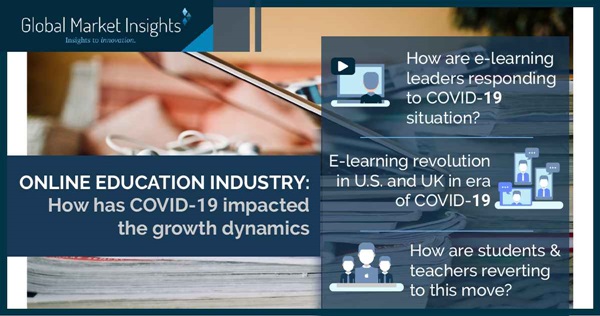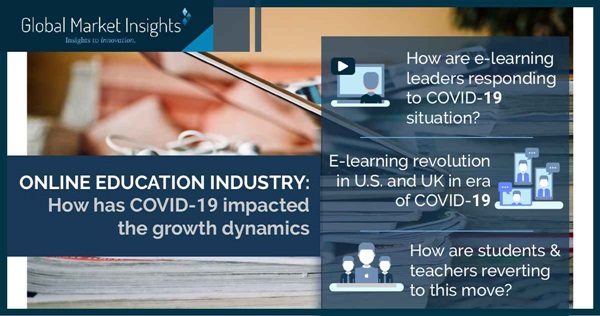If armed conflicts, climate change induced disasters, forced displacement, and protracted crisis were not enough already to disrupt the education of millions of children and youth globally, the COVID-19 pandemic has also emerged as a brutal force accelerating the count to an unpredictable value in the years to come. Surprisingly though, this outbreak seems to have brewed a major revolution in academia – bringing the significance of online education back to the fore.

It is not a hidden fact that COVID-19 pandemic has nearly paralyzed the global economy while denting various small-, medium-, and large- scale industries, and not to forget, the education industry. Considering the statistics put up by UNESCO, education has been hit hard by the ongoing health crisis, with over 1.53 billion learners out of school and 143 nation-wide school closures, impacting over 67.6 per cent of the world’s total enrolled learners. This sudden shift away from physical classrooms in different parts of the globe, has led people to brainstorm the possibilities of adopting online learning.
Online education is not a new thing in the global market- indeed- it has been prevalent since over a decade now. However, the dreaded COVID-19 is unmasking an all new face of online education in the world and although things are beginning to fall back to normalcy, unending debates on reopening of schools is still persistent, thus presenting an escalation in the online learning market graph.
This momentous growth has undeniably offered tremendous opportunities to various pioneers of the e-learning market to invest heftily and support the revolution in online education across various geographies of the world. Amongst some of these companies, Google had recently unveiled a number of initiatives which offered the kids an ideal solution to gain knowledge while in the comfort of their homes.
How are e-learning leaders responding to COVID-19 situation?
Having mentioned about Google’s initiative towards pushing the online education across different regions to an all new level, there are several other companies adding to this anticipated lucrative growth curve.
One such platform, Byju’s learning app, deemed to be one of the world’s most highly valued EdTech companies, declared that ever since it announced conducting free live classes on its application, in wake of the coronavirus pandemic, it recorded a massive 200 per cent increase in number of new students.
While, on the other hand, Tencent classroom, has been witnessing prolific gains since mid-February 2020 after the Chinese government instructed students to resume their studies via online platforms, in turn resulting in the largest ‘online movement’ in the history of education with about 81 per cent of kindergarten to class 12 students, attending classes via Tencent K-12 Online School in the Wuhan province.
On top of this, recent investment by Kozhikode’s start-up company, in this field has brought about a sea change in the online education market in India. News reports suggest that the company has recently unveiled a new video conferencing application, including the likes of Google Classroom or Zoom, to make the video conferencing learning hassle free for students and teachers during COVID-19. The app, Smart Classroom, facilitates the classes and meetings to be conducted through an interface with highly promising features than the regular online platforms.
Let alone the pioneers of online education, universities across the globe have also been supporting the need for education for their students by offering them free courses. An exemplary model for the same is given by one of the prominent ones – Harvard University. In April 2020, it was reported that the university had unlocked over 67 online courses for free to help academics thrive through lockdown.
Today, schools have been focusing more on imparting curricular knowledge to the students via online learning, which has slightly reduced their interest and inclination towards the e-learning classes. In this regard, Hyderabad’s Suchitra Academy had in July 2020 launched its own online Physical Education curriculum in India- SUCHITRA FITKID which would enable the student to take proper care of their health and fitness while being in lockdown. As per official sources, this online Physical Education course was designed by the World Badminton Champion- Ms PV Sindhu. One of the important points associated with this application is that is accurately complies with the CBSE board’s norms, thus bolstering the online education market in the country.
Such initiatives have offered a glimpse of the impending scenario of the overall online learning market during the challenging times of COVID-19.
E-learning revolution in U.S. and UK in era of COVID-19
Education industry is the second most revenue generating industries in the United States which is thriving at a prodigious pace since the last few years. Estimates claim that the industry is valued over more than USD 1 trillion.
This growth is predominantly backed by a phenomenal rise in paid user base for online education in the country. Online education industry size is anticipated to rise exceptionally in the coming months due to the surge in demand for virtual education amidst the lockdown being enforced nationwide. The situation in the States is still uncertain, as the nation is grappling to combat the ongoing pandemic. However, schools and universities have shifted to imparting online education to their students amidst these crucial times.
The UK remains not far when virtual learning is concerned. To that end, it is imperative to mention the instance of Farehem College. England based college- Farehem, along with HSDC and Highbury College have collectively been awarded over 100,000 pound grant from the Department of Education for improving the digital learning for students. Reports suggest that these colleges will work in unison to use curriculum specialist, from different subjects, to design a range of learning resources to support high level students with online learning.
How are students and teachers reverting to this move?
A transcending shift to online education in times of COVID-19 has led to a mix of opinions amongst different people. While some are of the opinion that the unplanned and brisk move to online learning with no training, little preparation, and insufficient bandwidth would offer a poor user experience that is unconducive to sustained growth, others believe that this new hybrid model of education will emerge successful while leveraging essential benefits in the due course of time.
In a nutshell, fundamental world events often stand as an inflection point for rapid innovation, one such example being rise of e-commerce post COVID-19. While, it is yet to be seen whether this will apply to e-learning as well, the online education is one of the few sectors where investment has not been paused no matter what the conditions are. This leaves the world to ponder about one thought: Will the education industry succumb to the COVID-19 pandemic or will it out pass the ordeal and shine in the global economy?
